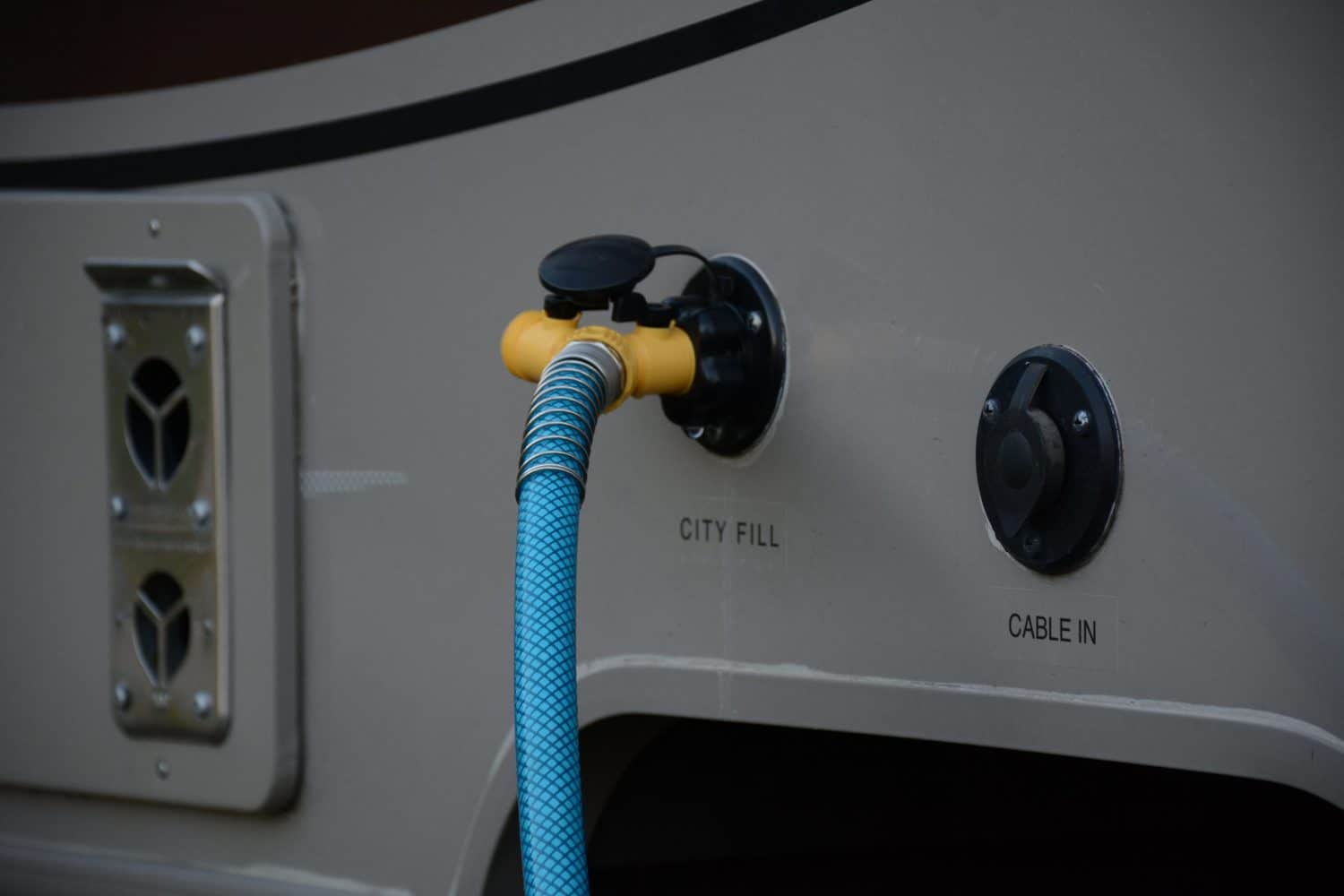We tested 5 products and ultimately concluded that the Zero-G from Teknor Apex was the best RV hose for fresh water.
Some first-timers are surprised to learn that they need a special water hose for their RV. However, regular garden hoses aren’t safe to drink from—at least not long-term. When you’re camping, it’s imperative to have access to fresh water, so having the right type of hose is just as essential.
1. Teknor Apex-4006-25 Zero-G -Best Overall
2. Camco Premium Drinking Water Hose -Most Durable
3. Gilmour Marine and Recreation Drinking Water Hose -Best For Easy Installation and Removal
4. SmartFlex GHT Fittings RV Hose -Best Kink Resistance
5. Valterra AquaFresh High Pressure Drinking Water Hose -Best Warranty
The Zero-G model comes from a reputable manufacturer and is made from top-notch materials, so it already has a few things working in its favor. It won’t take up too much space in your rig, and the hose can take a lot of punishment while still resisting punctures and leaks. The 5-year warranty doesn’t hurt, either.
Read on to learn more about the Teknor Apex Zero-G and the other hoses we tested.
Best 5 RV Water Hoses: Product Review Guide
1. Teknor Apex-4006-25 Zero-G—Best Overall
The Teknor Apex Zero-G RV Water Hose offers quality and affordability in one easy-to-store package. Because it’s so lightweight, you can transport it from one spot to another without any hassle, and the abrasion-resistant material ensures that it won’t crack during storage.
We chose the 1/2 inch 25-foot model for this roundup, but if you need a longer hose, the 50-foot version is another solid option. For more information on sizing, see the Buyer’s Guide, below.
2. Camco Premium Drinking Water Hose—Most Durable
The Camco Premium option has an increased thickness that sets it apart from the competition. In fact, it’s about 20 percent thicker than most of the other RV hoses we’ve listed, so it resists kinking as well as leakage.
The material is BPS and lead-free, so you won’t have to worry about contaminants from the water hose itself. We especially like the nickel-plated brass fittings, which are corrosion-resistant and extremely durable. Also, like the Teknor Apex model, it’s set at an affordable price.
3. Gilmour Marine and Recreation Drinking Water Hose—Best For Easy Installation and Removal
Those of you who only plan to use your RV water hose once in a while will appreciate the quick installation and removal that the Gilmour Marine model offers. It features ergonomic couplings that make connecting a breeze, and disconnecting is even quicker.
Thanks to the sturdy five-layer construction, the hose is also abrasion- and kink-resistant. The price is another attractive aspect—you won’t need to open your wallet very far when you purchase this unit.
4. SmartFlex GHT Fittings RV Hose—Best Kink Resistance
We were favorably impressed by the way this hose managed to lie completely flat once it was empty, as if there had never been any water in it at all. The hose is made from a hybrid polymer that offers superior kink resistance, so you can easily store it for long periods when you’re not using your RV.
Although this isn’t a heated water hose, it can withstand temps down to 20 degrees below zero. On the other end of the spectrum, it won’t suffer damage in hot weather—it’s rated for use in temperatures up to 140 degrees Fahrenheit.
5. Valterra AquaFresh High Pressure Drinking Water Hose—Best Warranty
The Valterra AquaFresh weighs just 2.5 pounds, so it’s one of the most lightweight options out there. Because it’s also suitable for garden use, it’s also quite versatile. The price is appealing, too, especially given the fact that it’s equipped with a 10-year warranty.
We should point out that the material doesn’t hold up well in hot weather—the exterior feels sticky to the touch when it’s left out too long in the sun. Fortunately, the warranty should take care of any issues you might have.
Buyer’s Guide
Important Features
Length
Most RV hoses come in two lengths: 25 or 50 feet. Which one should you choose?
It won’t do you any good to have a hose that won’t reach the water hookup at your campsite. Fortunately, most hookups will be located within 25 feet of your campsite. You should be fine with a 25-foot hose the majority of the time.
Nonetheless, it’s a good idea to have two 25-foot RV hoses on hand, just in case. That way, you can connect them if the water hookup is too far away. It will also give you a backup option if something happens to one of the hoses.
Why not just invest in a 50-foot unit from the beginning? You can certainly do so. However, the extra length will make the hose more cumbersome. There’s no need to deal with such an ungainly, heavy hose if you’re not taking advantage of its full length. Longer hoses are also harder to clean and take longer to dry out.
Diameter
Many of the hoses you’ll encounter will offer a diameter of 5/8″. Although it’s likely that the pipes in your RV measure 1/2″ in diameter, a 5/8″ hose is still a good bet. The narrower opening will restrict water flow, which can boost the pressure.
If you can only find a certain model in a 1/2″ diameter, that’s an acceptable substitute. As long as the hose is made from high-quality material, you probably won’t notice the difference.
Cost
You can get a quality RV water hose for as little as $20. In fact, most of the options on our list fall within the $20-$35 range. It’s possible to spend up to $100 for a unit made from heavy-duty materials, but it’s not always necessary.
Heated RV hoses are another story. If that’s the type of hose you’re buying, expect to spend between $150 to $200 for a highly-rated model.
Terms To Watch For
If this is your first time buying an RV water hose, there are certain terms you should familiarize yourself with. That way, you’ll have a better idea of what you’re getting.
BPA-Free
BPA, or bisphenol A, is an industrial chemical found in certain plastics and epoxy resins. Since resins are often used to coat water supply lines, it’s not unusual to find it in RV hoses.
Exposure to BPA may have adverse health effects, especially on children. Although the USDA says it’s safe as long as the levels aren’t too high, many consumers opt for products that carry the “BPA-free” label.
Lead-Free
If the hose is certified lead-free, that means that tests were unable to detect any lead in the materials. This certification will last for the entire life of the hose. Lead-safe hoses don’t have any evidence of lead dust or leaching, but lead was detected at some point during testing.
Expandable
This type of hose can expand up to 3 times its original length and self-drain when the water pressure is turned off. This makes for easy storage and increased portability. Since the hose won’t kink or tangle up, they’re durable as well as efficient.
Be aware that not all expandable hoses are safe for drinking. Make sure the one you buy is suitable for these purposes.
Heated
Do you need a heated hose for your RV? Some of you might not think so, especially if you live in a warm climate. Even if you don’t plan on camping in the winter, though, a heated RV hose is a good idea.
Temperatures can dip below freezing even in areas that don’t typically see a lot of frost. If this happens while you’re camping, your hose could freeze and crack, leaving you without an option for fresh drinking water. For best results, keep a heated hose on hand, in addition to your regular hose.
Kink-Resistant
When hoses kink and tangle up, the water flow is restricted. If the problem goes unresolved, it can even cause damage to the hose. That’s why it’s best to invest in a model that’s resistant to kinks. Fortunately, most of the units we tested fall into this category.
Accessories
Once you’ve selected the perfect water hose, you should complement the purchase with accessories to increase its efficiency. The following ones are common:
- Water Filtration System—These are designed to remove sediment, bacteria, and other microorganisms from your water. They can also eliminate the taste of chlorine.
- Water Pressure Regulator—Low pressure can be annoying, but high pressure can wreak havoc with your RV’s equipment. A regulator will keep the pressure at a satisfying 40-50 psi.
- Quick Connects—With these fittings, you’ll be able to connect two hoses together in a flash. They’re easy to use and should be an essential component in your hose setup kit. Be aware that the name is sometimes shortened to “QDC’s” or “QDs”.
- 90-Degree Elbow—These are meant to ease the strain on the hose so that it lasts longer. Look for one that’s made of brass, stainless steel, or another corrosion-resistant material.
Storage Tips
The first rule of freshwater hose storage is: Always store it away from your other RV hoses. If it gets too close to the hoses you use for your black and gray water tanks, it might get contaminated, thereby ruining your investment.
Storage options include hooks, hose bags, and boxes. Hooks are convenient, but it can be hard to ensure that the material won’t come into contact with any contaminants.
If you store the hose by hanging it up, screw the ends together to keep excess water from leaking out. In fact, this is a good idea anyway, as it helps to keep out debris. You can also buy caps for the ends to serve the same purpose.
Hose bags are usually made of mesh, which is lightweight but offers minimal protection. For best results, pick up a sealed bucket from a home improvement store and use that for storage. Just make sure it’s large enough to contain your hose before you hit the road.
Also, before you wrap up the hose, you should rid it of as much water as possible. If there’s water left in the hose, mold and mildew could form on the interior.
Cleaning Tips
To sanitize a drinking hose, fill a tub with a solution of 1 cup bleach to 5 gallons of warm water. Allow the hose to soak in the solution for 15-30 minutes, then rinse it well. For best results, repeat this process at least twice a year.
In Conclusion
If you want access to fresh water during your camping trip, the Teknor Apex Zero-G RV hose is an excellent choice. It’s durable, affordable, and it won’t get tangled and knotted during use. The company offers a generous warranty, too, so you should be covered even if you do run into problems.
Best of luck, and happy camping!
Check out our article on: 7 RV Water Filter Options For Fresh Drinking Water

